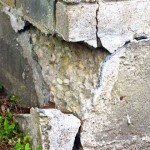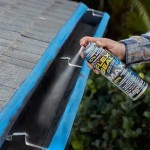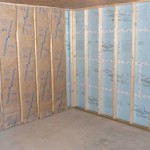Best Flooring Options for a Concrete Basement Bathroom
Choosing the right flooring for a basement bathroom presents unique challenges compared to other areas of the home. Concrete basements are inherently prone to moisture, temperature fluctuations, and potential flooding, factors that can significantly impact the longevity and performance of various flooring materials. The ideal flooring will not only withstand these conditions but also provide comfort, enhance the aesthetics of the bathroom, and contribute to a healthy indoor environment. This article will explore several flooring options suitable for concrete basement bathrooms, outlining their pros, cons, and specific considerations for installation and maintenance.
Addressing Moisture Concerns in Basement Bathrooms
Moisture is the primary adversary in any basement environment, and a bathroom, given its regular water usage, amplifies this concern. Concrete is porous and can wick moisture from the ground, leading to dampness and potential mold growth. Therefore, any flooring solution must either be waterproof, water-resistant, or installed with a robust moisture barrier. Understanding the existing moisture levels in the concrete slab is crucial before proceeding with any flooring installation. Performing a moisture test, such as a calcium chloride test, will determine the moisture vapor emission rate (MVER) and inform the selection of appropriate flooring and underlayment systems.
Furthermore, proper ventilation is essential in a basement bathroom to minimize moisture buildup. An adequate exhaust fan, ducted to the exterior of the house, is critical for removing humidity after showers or baths. This ventilation will not only protect the flooring but also prevent the growth of mold and mildew on walls and ceilings.
Popular Flooring Choices and Their Suitability
Several flooring materials are commonly considered for basement bathrooms, each with its own strengths and weaknesses in relation to moisture resistance, durability, comfort, and installation requirements.
Vinyl Flooring: Vinyl flooring, especially luxury vinyl plank (LVP) or luxury vinyl tile (LVT), is a popular choice for basement bathrooms due to its excellent water resistance. LVP and LVT are composed of multiple layers, including a waterproof core, a decorative layer, and a wear layer that resists scratches and stains. These materials are available in a wide range of styles, mimicking the look of hardwood, stone, or tile. Installation is relatively straightforward, with options for click-lock floating floors or glue-down installations. For basement bathrooms, a floating vinyl floor with a built-in underlayment that includes a moisture barrier is often the preferred method. Consider the thickness of the wear layer, as a thicker wear layer will provide greater durability and resistance to scratches and dents.
Ceramic and Porcelain Tile: Ceramic and porcelain tile are highly durable and water-resistant flooring options suitable for basement bathrooms. Porcelain tile, in particular, is virtually impervious to water, making it an excellent choice for environments with high moisture levels. Tile is available in a vast array of colors, sizes, and styles, allowing for significant design flexibility. However, tile installation requires a level subfloor and proper techniques to ensure a waterproof grout seal. Grout lines can be susceptible to staining and mold growth if not properly maintained. Epoxy grout is a more expensive but highly effective option that offers superior water resistance and stain resistance compared to cement-based grout. Because tiles can be cold on the feet, consider installing radiant floor heating beneath the tile for added comfort.
Epoxy Flooring: Epoxy flooring is a seamless, extremely durable, and waterproof option suitable for concrete basement bathrooms. Epoxy is a resinous material that is applied directly to the concrete slab, creating a hard, chemical-resistant surface. Epoxy flooring is available in various colors and finishes, including decorative flakes or metallic pigments. It is highly resistant to stains, chemicals, and impact, making it a suitable choice for high-traffic areas. Professional installation is generally recommended for epoxy flooring to ensure proper surface preparation and application techniques. While epoxy is waterproof, ensuring the concrete slab is properly sealed and prepared is crucial to prevent moisture from migrating through the slab and affecting the epoxy bond.
Engineered Wood Flooring: While solid hardwood flooring is generally not recommended for basements due to its susceptibility to moisture damage, engineered wood flooring can be considered under certain circumstances. Engineered wood consists of a thin layer of hardwood veneer bonded to multiple layers of plywood or high-density fiberboard (HDF). This construction provides greater dimensional stability compared to solid hardwood, making it less prone to warping or cupping in humid environments. However, engineered wood is not waterproof, and any exposure to standing water can cause damage. If considering engineered wood for a basement bathroom, it is essential to install a robust moisture barrier and address any potential sources of moisture. Furthermore, selecting an engineered wood product with a thicker wear layer will improve its durability and resistance to scratches.
Rubber Flooring: Rubber flooring is a resilient and water-resistant option that can be suitable for basement bathrooms. Rubber is available in rolls, tiles, or interlocking mats. It provides a comfortable, slip-resistant surface that is easy to clean. Rubber flooring is particularly well-suited for areas where comfort and safety are paramount, such as bathrooms used by children or seniors. While rubber is water-resistant, it is not completely waterproof, and prolonged exposure to standing water can cause damage. Proper subfloor preparation and adhesion are important to prevent moisture from accumulating beneath the flooring. Rubber flooring can have a strong odor initially, which may be a concern for some individuals.
Carpet Tiles (with specific considerations): Carpet is generally discouraged in basements due to its susceptibility to mold and mildew growth in damp environments. However, carpet tiles designed for basement use, particularly those with a waterproof backing and mold-resistant fibers, can be considered under certain conditions. These tiles should be installed with a breathable underlayment to allow for moisture to escape and prevent buildup. Regular cleaning and maintenance are essential to prevent the accumulation of moisture and allergens. Carpet tiles are more easily replaced than broadloom carpet if damage occurs. However, even with these precautions, carpet in a basement bathroom carries a higher risk of moisture-related problems compared to other flooring options.
Key Considerations for Installation and Preparation
Regardless of the flooring material selected, proper installation is crucial for ensuring its long-term performance and preventing moisture-related issues. Several key considerations should be addressed before and during the installation process.
Subfloor Preparation: The concrete subfloor must be clean, level, and dry before installing any flooring. Any cracks or imperfections should be repaired with a concrete patching compound. The subfloor should be thoroughly cleaned to remove any dirt, debris, or adhesives from previous flooring installations. If the subfloor is uneven, self-leveling compound may be required to create a smooth, flat surface. A moisture test should be performed to determine the moisture vapor emission rate (MVER) of the concrete. If the MVER exceeds the manufacturer's recommended limit for the chosen flooring, a moisture mitigation system may be necessary.
Moisture Barriers and Underlayments: A moisture barrier is a critical component of any basement flooring installation. This barrier can be a sheet of polyethylene film placed directly over the concrete subfloor, or it can be a liquid-applied membrane. The moisture barrier prevents moisture from migrating from the concrete slab into the flooring material. An underlayment can provide additional benefits, such as cushioning, sound insulation, and improved thermal performance. When selecting an underlayment, it is essential to choose one that is compatible with the chosen flooring material and designed for use in basement environments. Some flooring products, such as LVP and LVT, may have a pre-attached underlayment that includes a built-in moisture barrier.
Acclimation: Many flooring materials, particularly vinyl and engineered wood, require acclimation to the room's temperature and humidity levels before installation. Acclimation allows the material to expand or contract to its equilibrium moisture content, minimizing the risk of gaps or buckling after installation. Follow the manufacturer's instructions for acclimation, which typically involves storing the flooring material in the room for a specified period, usually 48 to 72 hours.
Professional Installation: While some flooring options, such as click-lock vinyl, can be installed by experienced do-it-yourselfers, other materials, such as tile and epoxy, often require professional installation. Professional installers have the expertise and equipment to ensure proper subfloor preparation, accurate measurements, and precise installation techniques. They can also identify and address any potential issues that may arise during the installation process.
Ongoing Maintenance and Care
Proper maintenance is essential for extending the lifespan and preserving the appearance of any basement bathroom flooring. Regular cleaning and prompt attention to spills or leaks will help prevent moisture-related problems and maintain a healthy indoor environment.
Regular Cleaning: Sweep or vacuum the floor regularly to remove dirt and debris. Use a damp mop with a mild detergent to clean the floor as needed. Avoid using harsh chemicals or abrasive cleaners, as these can damage the flooring surface. For tile floors, regularly clean the grout lines with a grout brush and a grout cleaner to prevent staining and mold growth. Consider sealing the grout periodically to enhance its water resistance.
Addressing Spills and Leaks: Promptly clean up any spills or leaks to prevent moisture from penetrating the flooring or the subfloor. Use absorbent cloths or towels to soak up the excess water. If the spill is particularly large or if there is evidence of water damage, consider using a wet/dry vacuum to remove the water.
Humidity Control: Maintaining a consistent humidity level in the basement bathroom can help prevent moisture-related problems. Use an exhaust fan during and after showers or baths to remove excess humidity. Consider using a dehumidifier in the basement to control overall humidity levels.
Regular Inspections: Periodically inspect the flooring for signs of damage, such as cracks, gaps, or water stains. Address any issues promptly to prevent further damage. Check the grout lines for cracks or deterioration and repair or replace them as needed.
Choosing the right flooring for a concrete basement bathroom involves careful consideration of moisture resistance, durability, comfort, and installation requirements. By understanding the unique challenges of basement environments and selecting a flooring material that is well-suited for these conditions, homeowners can create a bathroom that is both functional and aesthetically pleasing.

What S The Best Flooring For A Cement Basement Floor

What Are The Best Flooring For Basement In Homes

Best Flooring For Bathrooms 7 Great Options 3 To Avoid Flooringstores

6 Inspiring Ideas For Basement Flooring In Portland

Best Basement Flooring The Warmest Floor Covering Is Cork

15 Diy Basement Flooring Ideas Affordable Options For Basements

Best Bathroom Flooring Cork Tile For Rest Of The House Icork Floor

What Is The Best Flooring For Basements Get Pros And Cons

What Are The Best Flooring Options For A Concrete Substrate And Design

9 Best Tile Options For Your Bathroom Floor
Related Posts







